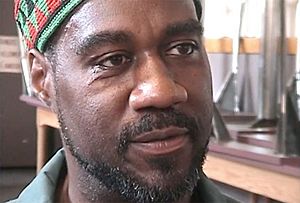Jalil Muntaqim facts for kids
Quick facts for kids
Jalil Abdul Muntaqim
|
|
|---|---|

Muntaqim in 2000
|
|
| Born |
Anthony Jalil Bottom
October 18, 1951 Oakland, California, U.S.
|
| Occupation | Activist |
| Organization | NAACP, Black Panther Party, Black Liberation Army, Citizen Action of New York Rochester Chapter |
Jalil Abdul Muntaqim (born Anthony Jalil Bottom; October 18, 1951) is an activist and former member of the Black Panther Party (BPP) and the Black Liberation Army (BLA). He spent 49 years in prison after being found guilty of serious crimes.
In August 1971, he was arrested in California. He was charged with involvement in the deaths of two NYPD police officers, Waverly Jones and Joseph A. Piagentini, in New York City on May 21, 1971. In 1975, he was found guilty and sentenced to a long prison term.
Muntaqim became well-known for being denied parole many times, even though he was eligible since 1993. In June 2020, he was reported to be sick with COVID-19. He was released from prison on October 7, 2020, after more than 49 years.
He was played by actor Richard Brooks in the 1985 TV movie Badge of the Assassin.
Contents
Early Life and Activism
Jalil Abdul Muntaqim was born Anthony Jalil Bottom in Oakland, California. He grew up in San Francisco. As a teenager, he became interested in the civil rights movement of the 1960s.
Muntaqim joined the National Association for the Advancement of Colored People (NAACP). He helped organize events for the group. In high school, he was active in the Black Student Union. He often spoke out on behalf of the organization. He also took part in street protests against police brutality.
At 18, he joined the Black Panther Party. This was after the death of Martin Luther King Jr.. Muntaqim believed that strong action was needed to fight racism. He wanted to end the unfair treatment of Black people.
While in the Black Panther Party, Muntaqim shared beliefs with the Black Liberation Army. This group focused on more forceful ways to achieve Black national self-determination. Its members were skilled in military strategies. They were seen as the armed part of the political movement.
Arrest and Time in Prison
Muntaqim and Albert “Nuh” Washington were arrested. They were charged in connection with the deaths of two NYPD officers in May 1971. They were arrested in San Francisco.
Later, in 1973, Herman Bell was arrested for other reasons. But police connected him to a fingerprint found at the scene. The first trial for the men did not reach a verdict. The second trial in 1975 resulted in Muntaqim being found guilty. He was sentenced to a long prison term.
These convictions were part of a larger FBI program. It was called Operation NEWKILL. This program aimed to find and imprison members of the Black Liberation Army. It involved close teamwork between the FBI and local police.
Muntaqim stayed active in politics while in prison. He wrote about his ideas. He also worked with activists both inside and outside prison. While in prison, he met other Black revolutionaries. They inspired him to become a Muslim. He then took the name Jalil Abdul Muntaqim. The name Muntaqim means "avenger." He never legally changed his name.
He was involved in the National Prisoners Afrikan Studies Project. This group teaches inmates about their rights. In 1976, he started the National Prisoners Campaign. This group asked the United Nations to recognize that political prisoners exist in the United States.
During his 49 years in prison, Muntaqim and other Black Panthers were often called political prisoners. Groups like the National Conference of Black Lawyers used this term. However, the United States government does not recognize people as political prisoners within its borders.
Legal Challenges and Voting Rights
In 1994, Muntaqim challenged a law in New York. This law prevented people with serious convictions from voting. He argued that it unfairly affected African Americans. He said it went against the Voting Rights Act.
His case, Muntaqim v. Coombe, was first dismissed. Later, in 2005, the case was heard again. The court decided it could not hear the case. This was because Muntaqim had never voted or had the right to vote in New York.
Later Charges
In 1999, an investigation into the death of San Francisco police officer John V. Young was reopened. This led to charges against eight former BLA members in 2007. Muntaqim was one of them.
Some members of the San Francisco Board of Supervisors asked for the charges to be dropped. They pointed to the use of harsh methods to get confessions. They also mentioned that people were denied their right to a lawyer. Charges were dropped against six of the eight people. Muntaqim and Bell agreed to reduced sentences.
Parole and Release
Some groups, like abolitionists, believed Muntaqim should be released. But law enforcement groups were against his release. In 2002, former New York City mayor Mike Bloomberg spoke out against his parole. He said Muntaqim's actions were "unforgivable."
Muntaqim had a parole hearing on November 17, 2009. He was denied parole again. He remained in prison. In June 2020, he was being treated for Coronavirus disease in a prison hospital. He tried to get released due to his health. But the courts did not approve his release.
However, a few months later, the parole board finally approved his release. His supporters confirmed that he left prison on October 7, 2020. Muntaqim was the last of the "New York Three" to leave prison. Herman Bell had been paroled in 2018. Albert “Nuh” Washington had passed away in 2000.
The day after his release, Muntaqim filled out a voting registration form. He was not eligible to vote because of his past conviction. The county's Republican Party leader, Bill Napier, told the district attorney about this. Muntaqim was charged with two serious offenses. But a grand jury later decided not to charge him.
Images for kids


